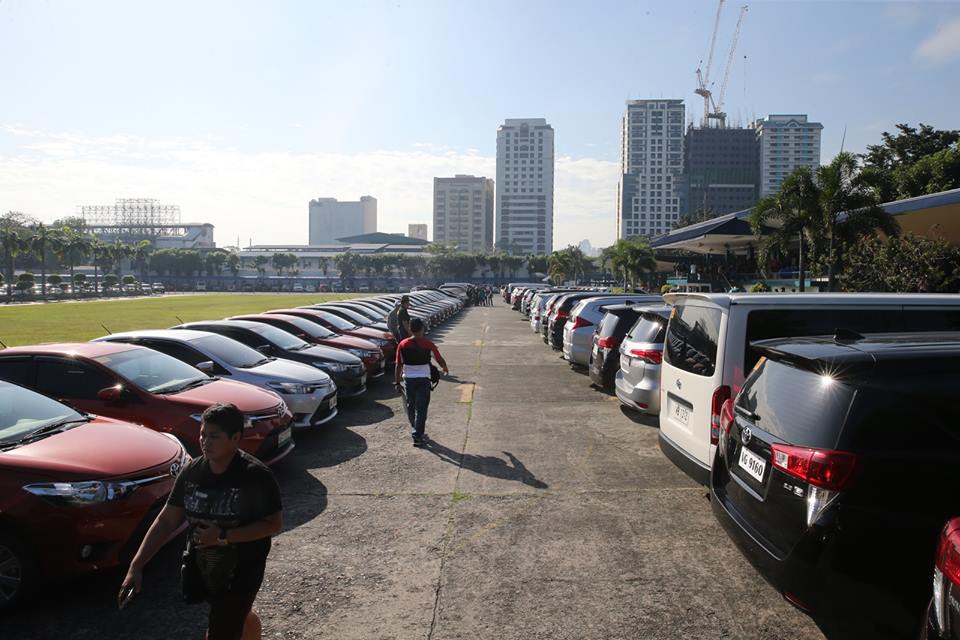Breaking
DOJ sets initial probe on complaints vs ‘rent-tangay’ suspects on April 26

The Department of Justice set the preliminary investigation next week on the complaint filed by National Bureau of Investigation (NBI) against the perpetrators behind the ‘rent-tangay’ modus operandi which has victimized car owners from different parts of the country. (Photo: Philippine National Police/Facebook)
MANILA—The Department of Justice set the preliminary investigation next week on the complaint filed by National Bureau of Investigation (NBI) against the perpetrators behind the ‘rent-tangay’ modus operandi which has victimized car owners from different parts of the country.
Assistant State Prosecutor Aristotle Reyes said the first hearing of the preliminary investigation on the NBI complaint of syndicated estafa, large scale syndicated estafa and carnapping against Rafaela Montes Anunciacion, Eleanor “Leah” Constantino Rosales, Tychichus Historillo Nambio, Jhennelyn Berroya, Anastacia Montes Cauyan, Eliseo Cortez, Marilou V. Cruz and Sabina Torrea is set for April 26.
In a subpoena released on Monday, the DOJ required Anunciacion and other respondents to appear before the panel and submit their respective counter-affidavits in hearing on the said day at 10 a.m.
Reyes said there is no decision yet to consolidate the Philippine National Police – Highway Patrol Group (PNP-HPG) and NBI complaints.
The prosecutor said that the panel will ask the defense lawyers if its alright to have the case consolidated since the similar respondents are named in the two complaints.
In its complaint affidavit, NBI stated that Anunciacion led the group to the scheme to defraud the car owners by getting money from them.
The PNP-HPG filed charges for swindling and syndicated estafa under Article 315 of the Revised Penal Code and Presidential Decree 1689 against the same perpetrators.
During the continuation of hearing on PNP-HPG complaint on Monday, Reyes said that hoping to end within the month the complaints filed by HPG since conducting last March 20.
Reyes said that the case could be terminated and deemed submitted for resolution by April 28 when the PNP-HPG and the private complainants are scheduled to file their reply to the counter-affidavits of the respondents.
“For these cases baka isang hearing na lang It will depend on the reply submitted by the complainants and the HPG,” Reyes noted.
So far, he said that there are still around 50 private complainants left from the complaints filed by the HPG after nine complainants withdrew from pursuing the case since they have already recovered their vehicles.
Anunciacion already filed counter-affidavits on those complaints.
She claimed that her rent-a-car business is legitimate and not a scam as tagged by authorities, citing “so many satisfied customers or clients to boot and nobody to rock the boat so to speak.”
On the other hand, Reyes admitted that the panel of prosecutors still do not know how many vehicles have been returned to the rightful owners.
He said once the PNP-HPG provided them a list, this will clear the complaints of some of the victims that their vehicles have yet to be returned to them.
“That is the concern of the PNP-HPG that’s why we will be requiring the HPG to furnish as a list of these vehicles since there are owners-complainants who told us that their vehicles has yet to be returned while others are saying they already have their vehicles,’ Reyes said
Reyes said they have granted the request of one of the respondents Cauayan for an extension to file her counter-affidavit with the warning that the panel should not be blame if there is a delay in the resolution of the case since they were the ones asking for time extension.
“In the interest of justice, we grant her motion and gave her additional two days to submit her counter-affidavit,” Reyes said.
The investigating DOJ panel chaired by Senior Assistant State Prosecutor Rosanne Balauag and other members of the panel are SASP Rex Gingoyon; Reyes, Rodan Parrocha, Bryan Jacinto Cacha Jr., Anna Noreen Devanadera, Jovyanne Escaño-Santamaria and Assistant Prosecution Attorneys Wendell Bendoval, Joan Garcia and Marc Eico Tariga.
Under the “rent-tangay” scheme, authorities said the suspects would convince car owners to become business associates in a rent-a-car service and have their cars rented for a hefty profit.
At first, the car owners will get paid but, unknowingly, in the end their vehicles will be pawned to other people and the suspects will disappear, making the victims unable to get their rented vehicles back.





















